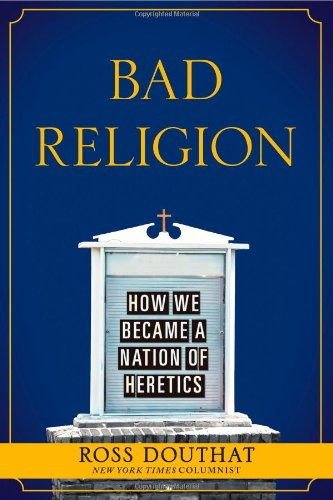Bad Religion: How We Became a Nation of Heretics By: Ross Douthat (Free Press, 2013)

Richard Dawkins and his fellow “new atheists” believe that the intelligentsia of the West are finally getting the picture and losing interest—and with it belief—in God and His accompanying system, religion. Ross Douthat says they couldn’t be more wrong, at least in America, but they are putting their finger on something: the change from orthodoxy to heterodoxy as our country’s prevailing “religion”.
Douthat, the well-known Op-Ed contributor to the New York Times, has written a book, documenting the decline of what he calls the “mis-managed empire” of America, and attempting to get at the root of that decline. Agreeing that there are many theories, he argues that the “most potent theories” are in fact religious ones because he says “at the deepest level, every human culture is religious—defined by what its inhabitants believe about some ultimate reality, and what they think that reality demands of them” (p. 2). Claiming that there are two prevailing ideas about the religious state of America, he eschews both. The first is the view of the Christian right that we have lost the faith of our fathers by simply falling away or by being “bullied into apostasy by secular elites”. The second is the view of the secular left that America in the last ten years, and particularly under the leadership of George W. Bush, has become the exact opposite: it is excessively religious and this is its problem. They claim that America is “a once-great nation brought low by piety and zeal”.
Douthat claims that these mutually contradictory positions both have a grain of truth because the proper way to see present day America’s problem “isn’t too much religion, or too little of it. It’s bad religion: the slow-motion collapse of traditional Christianity and the rise of a variety of destructive pseudo-Christianities in its place” (p. 3).
In eight chapters and a Conclusion, Douthat makes a very good case for his thesis. He divides the book into two parts, usually using Catholic and Evangelical protestant events, people and publications as evidence for his point. In the first part he describes the religious collapse of America in the post-World War II era. Starting from the 1950’s when Douthat believes there appeared to be “an era of intellectual confidence, artistic vitality, pews full to bursting, and a widespread sense that traditional Christian faith and contemporary liberal democracy were natural partners”, he shows that American religious culture was actually a white-washed tomb. With chapters on the convergence of the Christian center with secular modernism, and the tragic accommodation of “mere” Christianity with the emotional, anti-intellectual tenor of the age, Douthat documents that “In the 1960’s and 70’s…the heretics carried the day completely. America in those years became more religious but less traditionally Christian; more supernaturally minded but less churched; more spiritual in its sentiments but less pious in its practices” (p. 63). In the last chapter of the first section, Douthat admits that there were good signs of a Christian “resistance” in the 1990’s mostly centered in the Evangelicals and Catholics Together movement, but the Catholic priestly pedophile scandals and the “evangelical presidency” of George Bush more than off-set whatever gains had been made.
Part Two of Bad Religion documents the state of heretical Christianity in America today. Chapter five describes the powerful influence of modern Biblical scholarship on an American public “disillusioned with traditional Christianity but still religious enough to be eager for alternative portrayals of Jesus” (p. 152), centering his thought on the current debate on Christian origins and its spawning of popular heresies like those found in Dan Brown’s The Da Vinci Code. Chapter six delves into the sad world of the self-help gurus and the prosperity-gospel pundits, who have such overwhelming influence in America’s religious landscape. Chapter seven, jumping off from the best-selling Eat, Pray, Love, and entitled “The God Within” ploughs the fairly well-travelled ground of the incursion of eastern “spirituality” and what Philip Rieff calls the “triumph of the therapeutic” into modern American Christianity. In chapter eight, Douthat plays off messianism and apocalypticism against each other, showing the shambles that is American politics in the age of bad religion.
Not surprisingly, Douthat’s suggestions of a way forward are gloomy to say the least. In his Conclusion, he suggests that four current movements are vying for the position of leader in a Christian renaissance. While he articulates the strengths of each, he also presents a level-headed critique of each. The Post-modern opportunity is led by radical orthodoxy on the theological side and the emergent church on the ecclesiastical. Secondly, the Benedict option proclaims a withdrawal of Christian communities from society to preserve what is good in the faith and provide the seeds for its future renewal. Thirdly, the Next Christendom alternative finds the hope of Christianity outside America in the extraordinary growth of Christianity in Africa, Asia and Latin America. The fourth option he terms an age of diminished expectations, hoping that “our current economic turmoil” might help us to “reckon with the ways that bad theology and bad religion have helped bring us to our present pass” (p. 283). In the end, Douthat simply says, Christians need to be faithful and hope for a Christian renaissance by being “political without being partisan”, “ecumenical but also confessional”, “moralistic but also holistic”, and finally “oriented toward sanctity and beauty”. His passionate call for a lived Christianity is one we should all heed.
This dense book is worthy of a year-long discussion group. It travels so much ground and is so thoroughly foot-noted that simply a one- or two-time meeting will not easily do it justice. Bad Religion, however, will reward the effort.
Drew Trotter